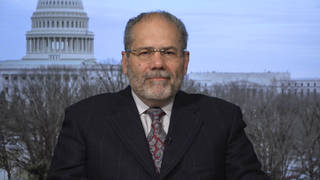
By Amy Goodman & Denis Moynihan
Lines. Lines at food pantries stretch block after block through urban neighborhoods. In suburban and rural America, lines of cars are miles long, as people suffering from hunger and food insecurity, many for the first time, wait hours for a box of groceries. Lines at COVID-19 testing sites grow, as the contagion spreads exponentially, with over one million infections per week. Nine months into the pandemic, and still we lack enough testing. Despite the risks of travel and large family gatherings, long lines dominate airport security checkpoints and crowded terminal gates. The TSA reports that more than three million people passed through U.S. airports last weekend, the highest number since mid-March. This, amidst an explosion in COVID-19 infections, hospitalizations, and deaths — morgues in some cities are overflowing — has public health officials pleading with people to stay home this Thanksgiving.
The pandemic confines us all, together yet apart, laying bare systemic racism, widening inequality, and fundamental flaws in our systems of governance. All of us have to eat, yet, here in the United States, the wealthiest nation in history, many are going hungry.
“We always talk about COVID as being the great unveiling of the inequalities in America,” Professor Raj Patel, who studies the global food system at the University of Texas, said on the Democracy Now! news hour. “But when you hear about 40% of American households experiencing food insecurity of some kind, that’s a new record, and it’s a very dark one to be breaking.”
In an October report, Feeding America, a national non-profit organization that tracks hunger, estimates 50 million people in the U.S. will suffer food insecurity as a result of the pandemic. The report notes, “Since the crisis began, food banks have faced a ‘perfect storm’ that includes surges in demand, declines in food donations due to supply chain challenges, fewer available volunteers, and other disruptions.” Children are especially vulnerable, especially the millions who rely on meals provided at schools, now closed or offering only limited attendance. Just last month, a federal court struck down a Trump administration policy that would have thrown up to 700,000 off of the Supplemental Nutrition Assistance Program, or SNAP, in the midst of the pandemic.
While promising news has emerged in recent weeks on prospective vaccines against COVID-19, the prospect of a vaccination in six or nine months doesn’t put food on the table.
President Donald Trump’s response? He tweets conspiracy theories and golfs, and by challenging public health regulations, he imposes herd immunity on the entire population, allowing the coronavirus to rip through the country, unimpeded. Republican Senate Majority Leader Mitch McConnell gave the Senate Thanksgiving week off. “Our country is going hungry on the week before Thanksgiving, and the Senate broke,” Congressmember Alexandria Ocasio-Cortez responded.
While food isn’t getting to millions who need it, the workers who produce our food also face enormous risks during the pandemic. Many of these frontline workers, from farmworkers to delivery people to those who stock grocery shelves and deliver our groceries, have contracted COVID-19. They don’t have the luxury of working from home.
Workers in meatpacking plants have suffered some of the nation’s worst COVID-19 outbreaks. In the spring, when the coronavirus was raging through meatpacking plants across the country, President Trump ordered the plants to remain open. Workers, many from immigrant communities and also from multigenerational households, were forced to work in close quarters, often with minimal personal protective equipment (PPE), no social distancing and virtually no testing.
A recent study from Columbia University concluded that meatpacking plants, as of July 21st, were the source of up to 300,000 COVID-19 cases and up to 5,200 deaths nationally, primarily through community spread from workers infected in the plants.
Sedika Buljic, Reberiano Garcia, Jose Ayala Jr., and Isidro Fernandez worked at Tyson Foods pork processing plant in Waterloo, Iowa, and all died between April and May of complications from COVID-19. In a lawsuit the families filed against Tyson Foods, they make the astounding allegation that “plant manager Tom Hart organized a cash-buy-in, winner-take-all, betting pool for supervisors and managers to wager how many plant employees would test positive for COVID-19.” Ultimately, at least six died and over 1,000 became infected. Tyson has suspended Hart and at least one other manager while ordering an investigation. Mel Orchard, an attorney for the families, told the Waterloo-Cedar Falls Courier, “It’s not going to change what happened. These people are gone, but can we prevent future deaths?”
The answer is a coordinated federal response at every level, with free testing, tracing, and equitable vaccine distribution. As for this weekend, spend Thanksgiving at home, if you can. Remember those who provide our food, often at great risk, and extend solidarity and support to those in need.











Media Options